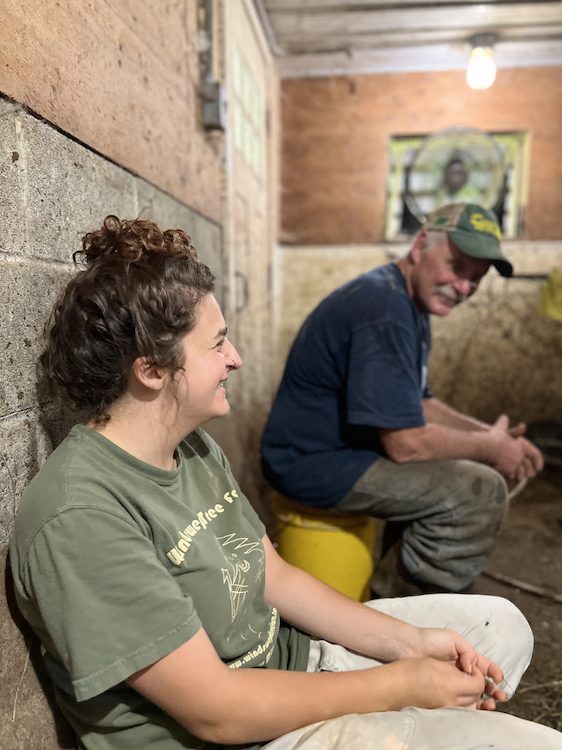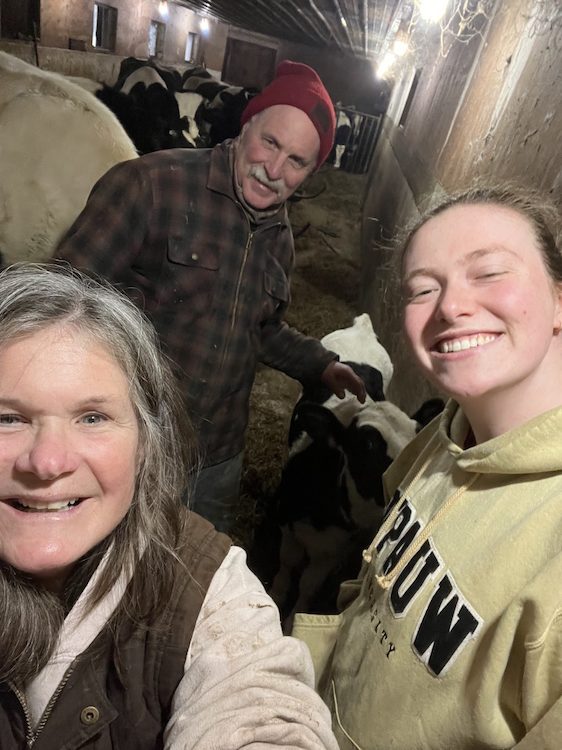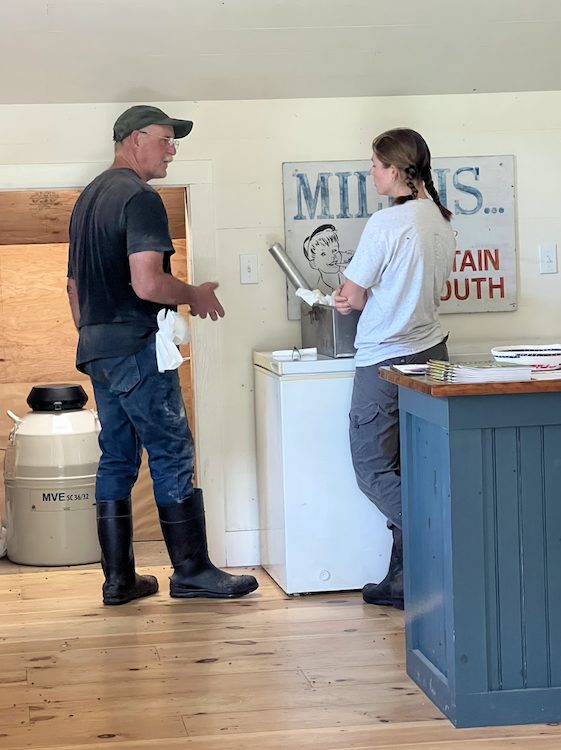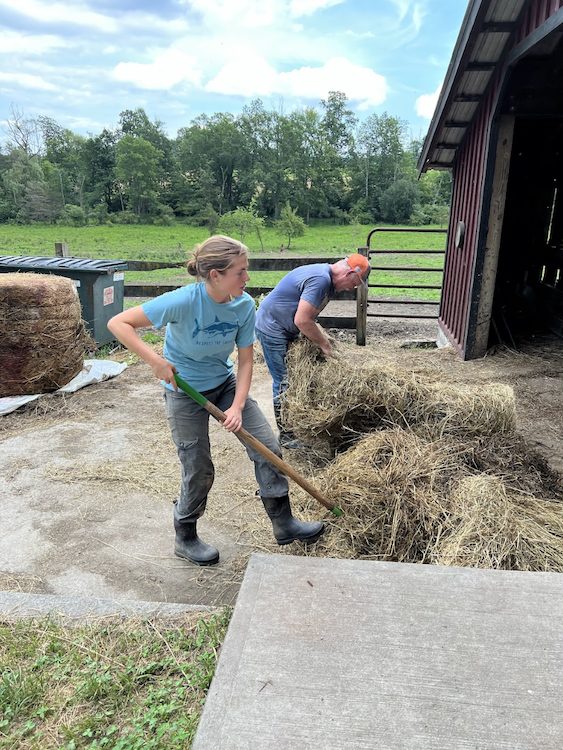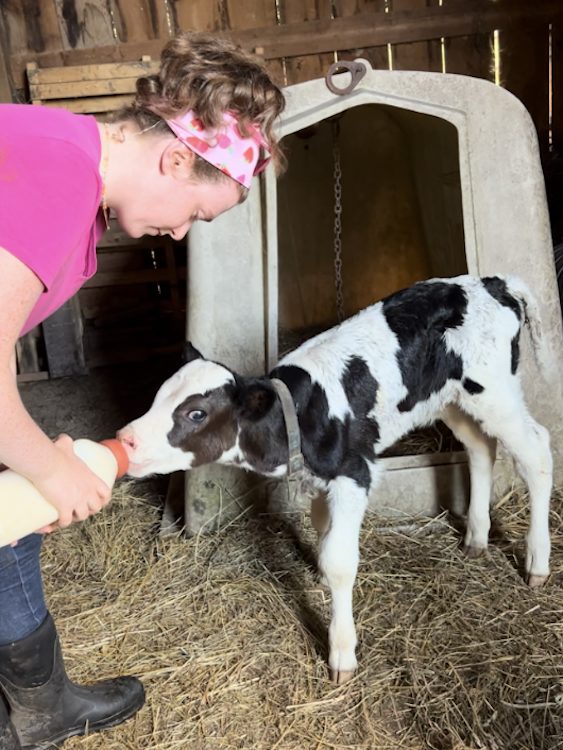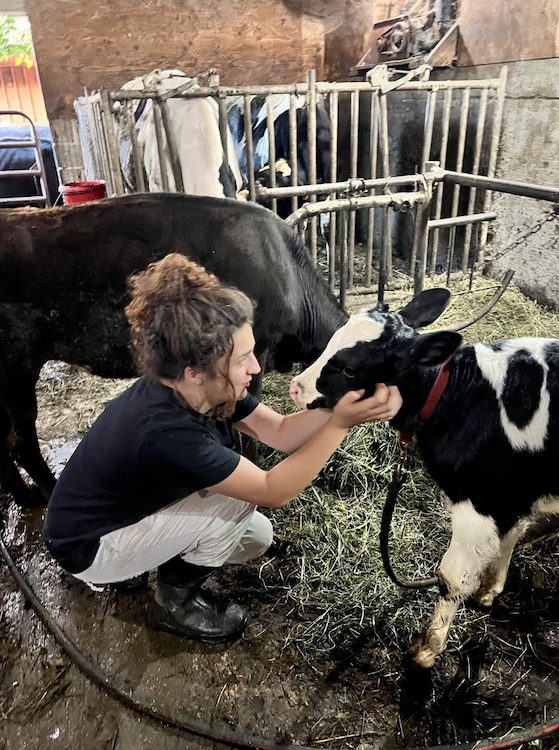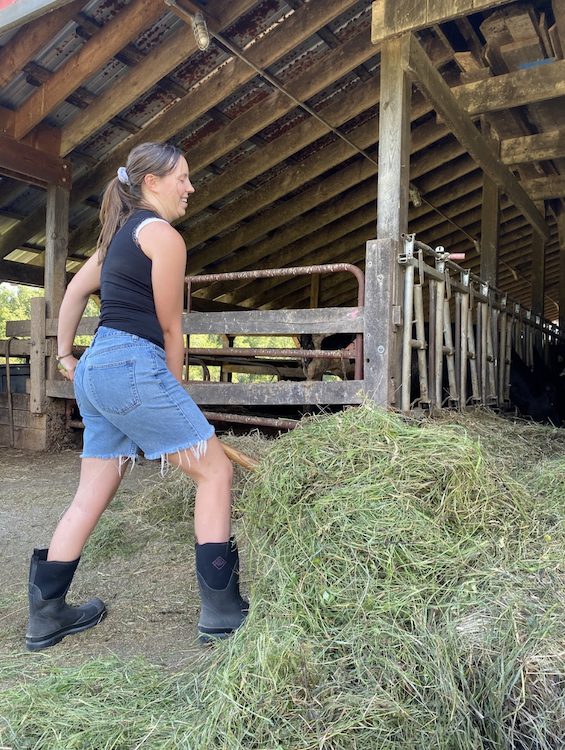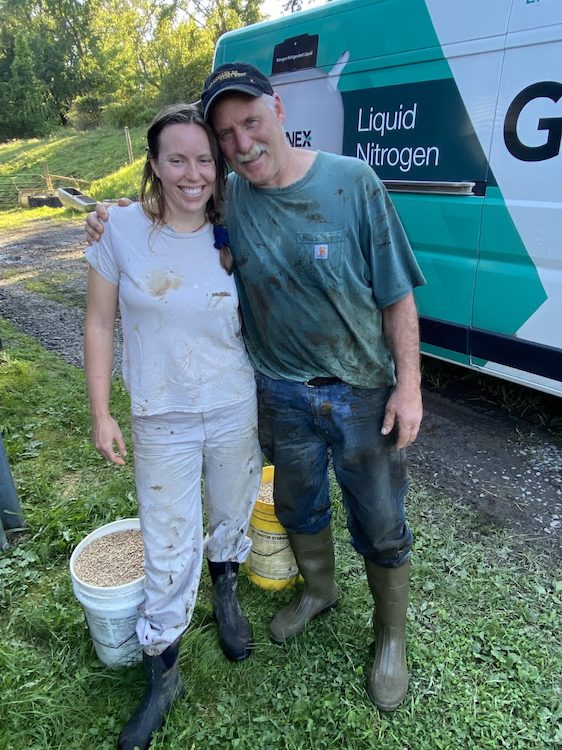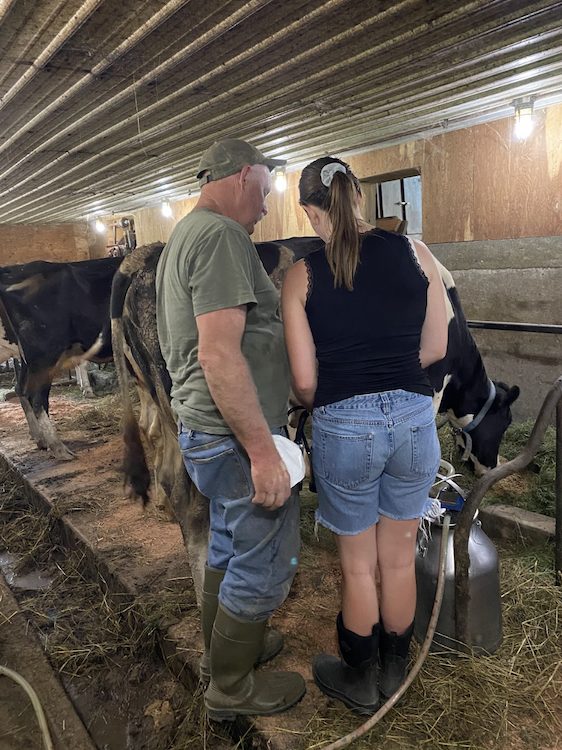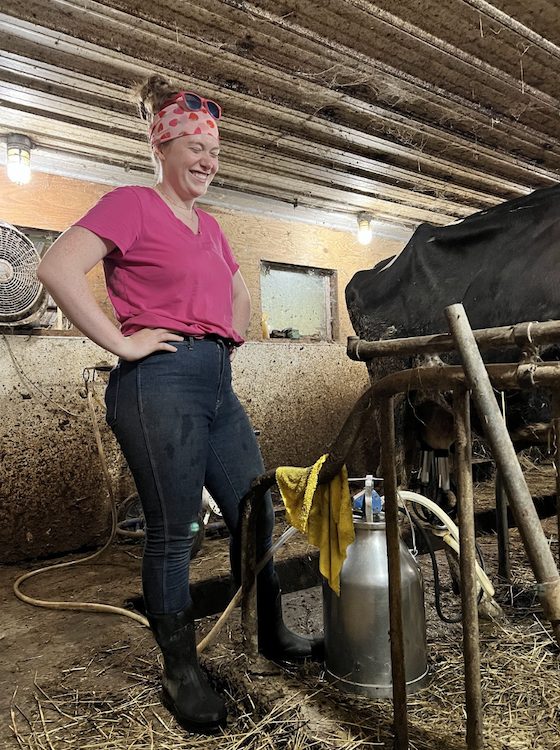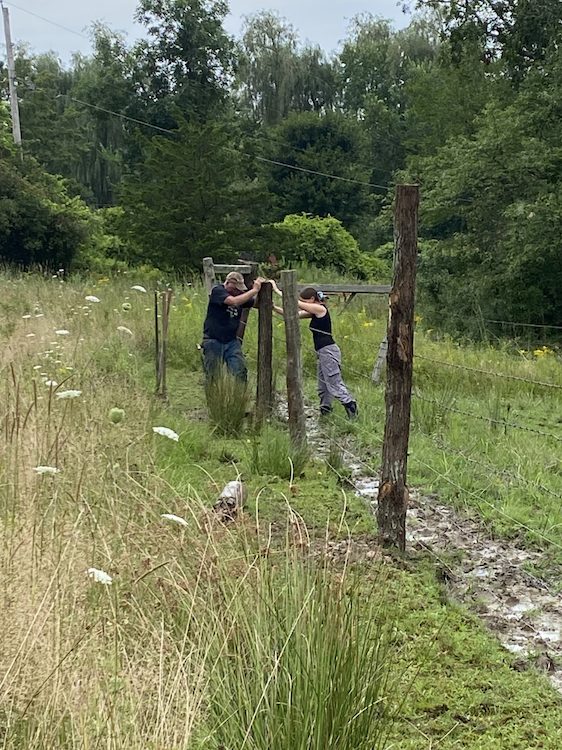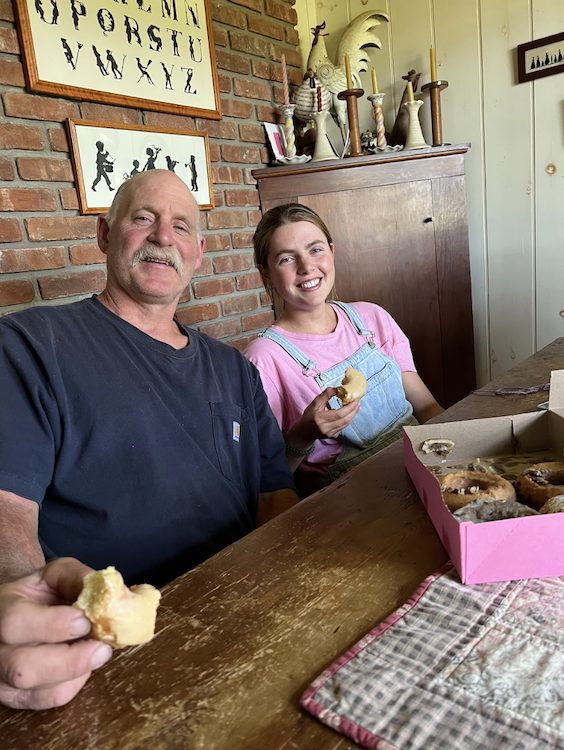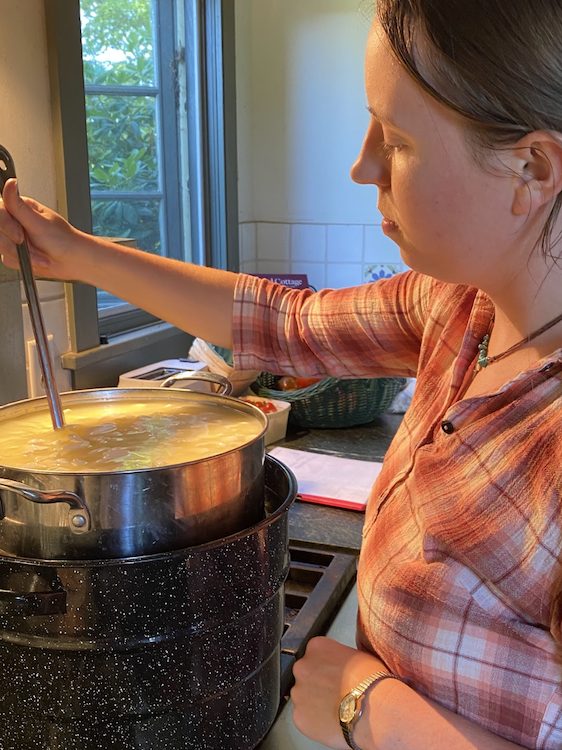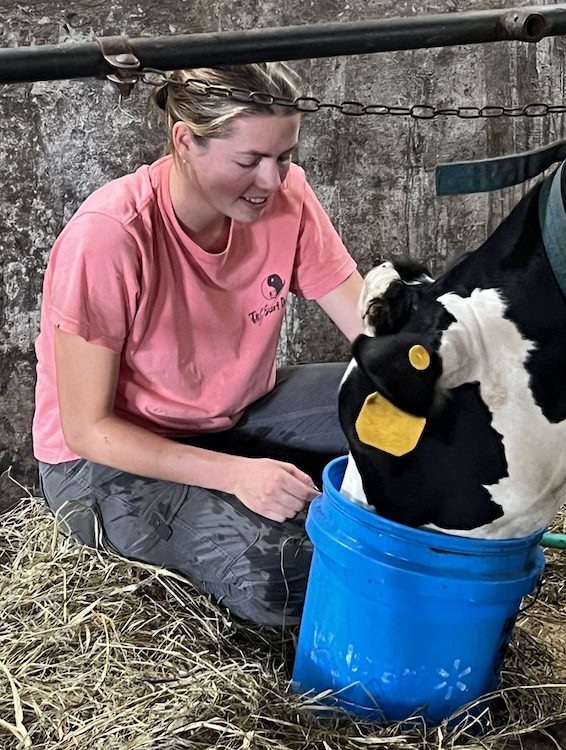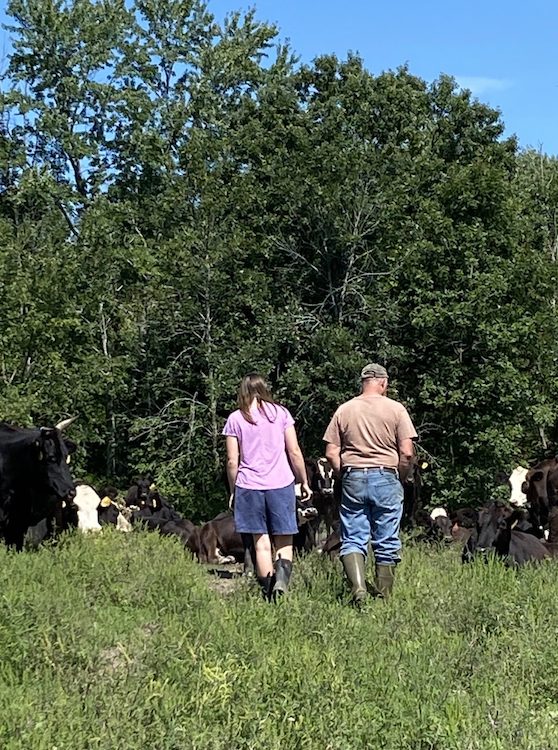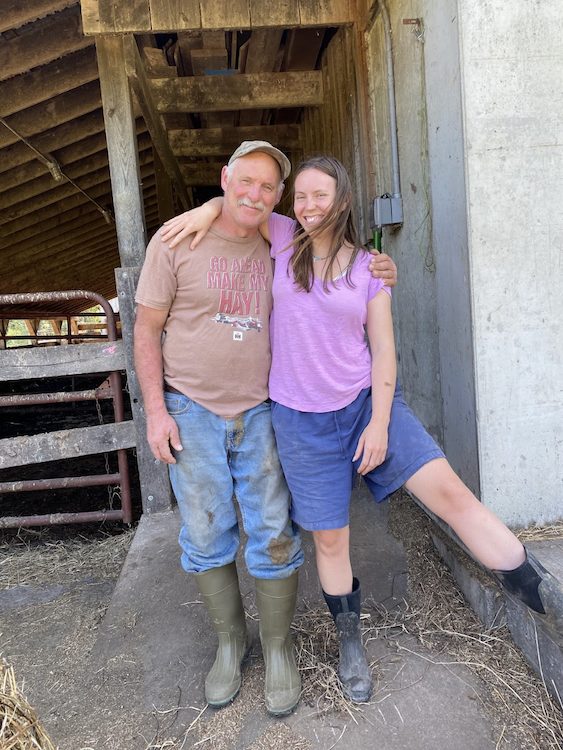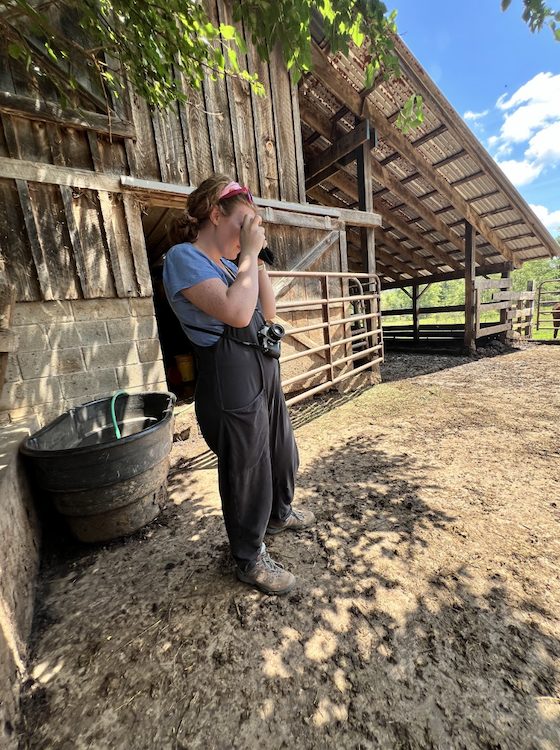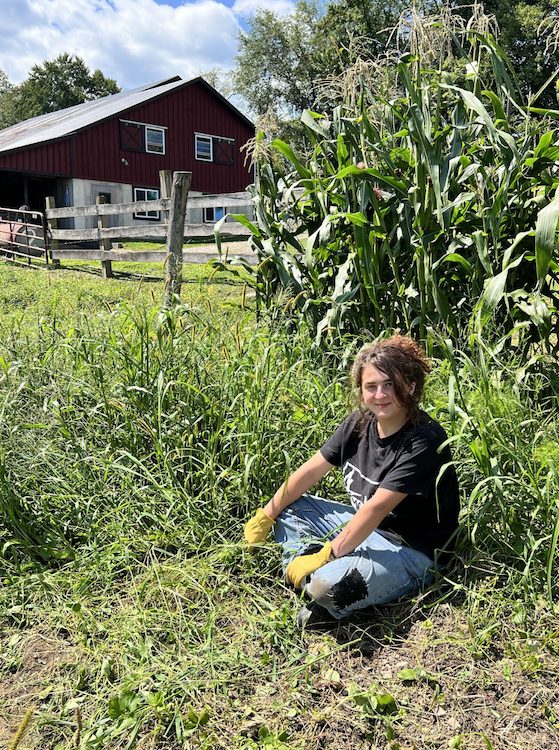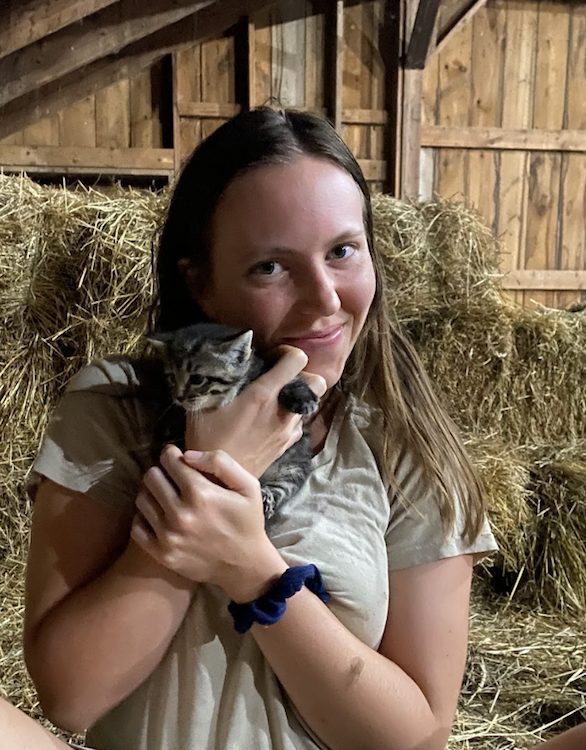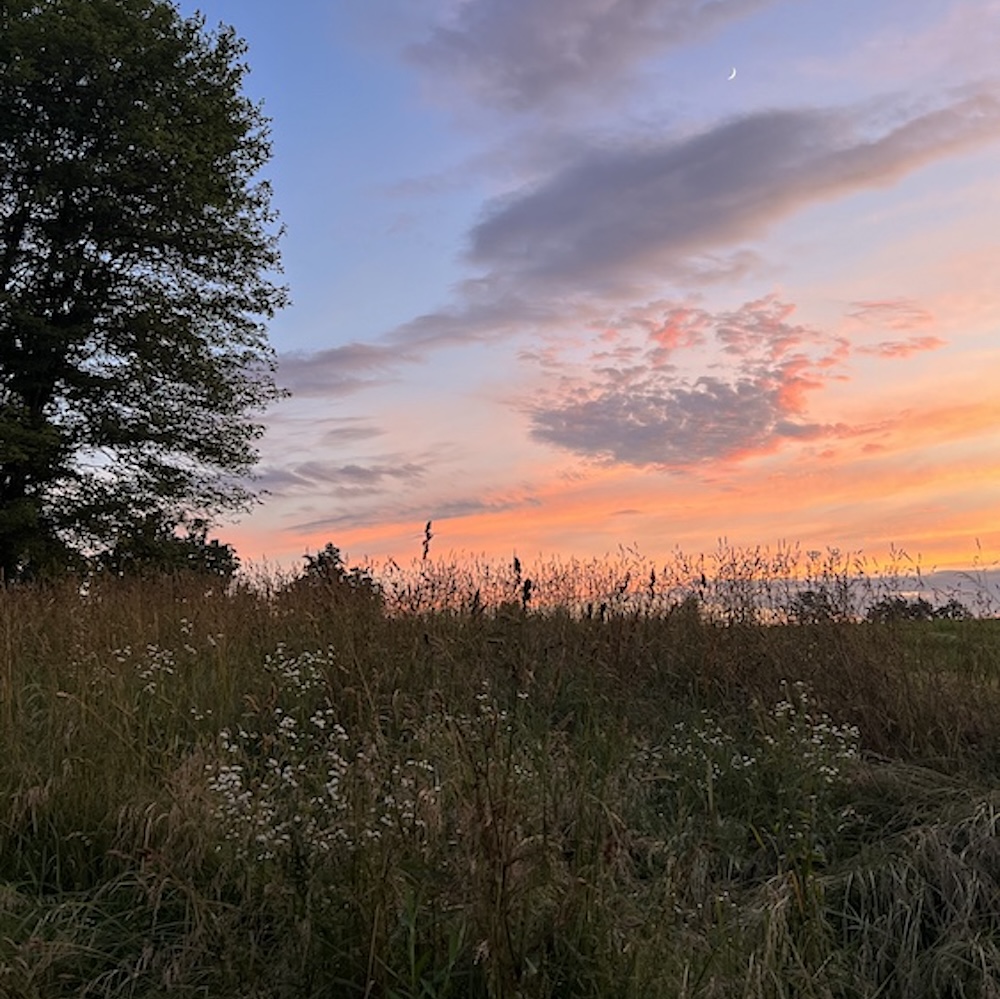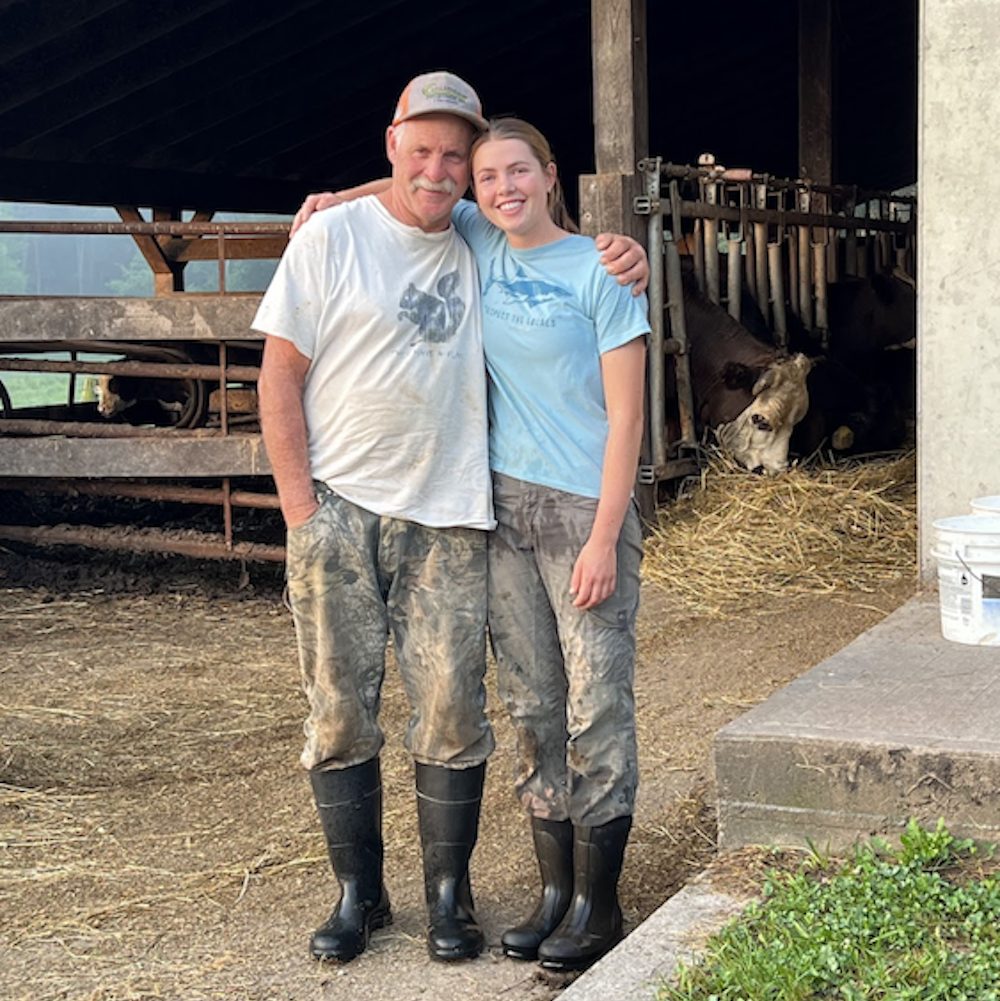
One Apprentice at a Time: Hilltop Farm + the Saxelby Legacy
Hilltop Farm is located down a long dirt road off of Lucas Turnpike in Accord, with bucolic rolling pastures and an epic view of the Catskills, if you make it to the back fields. There, Rebecca “Becky” Collins Brooks and her husband Barton “Bart” Brooks have long raised cows, in more recent decades focusing on Wagyu, which they sell from the farm, along with chicken, and soon, their own small batch cheeses and raw milk.
At Hilltop, Becky and her husband, Bart, have built a life rooted in deep love and earnest devotion—to their animals, land, and community. And thanks to the Anne Saxelby Legacy Fund, which sponsors apprentices to live and work on farms like Hilltop, the Brooks have had the opportunity to share what they know and love in ways that feel impactful and intimate, one apprentice at a time. 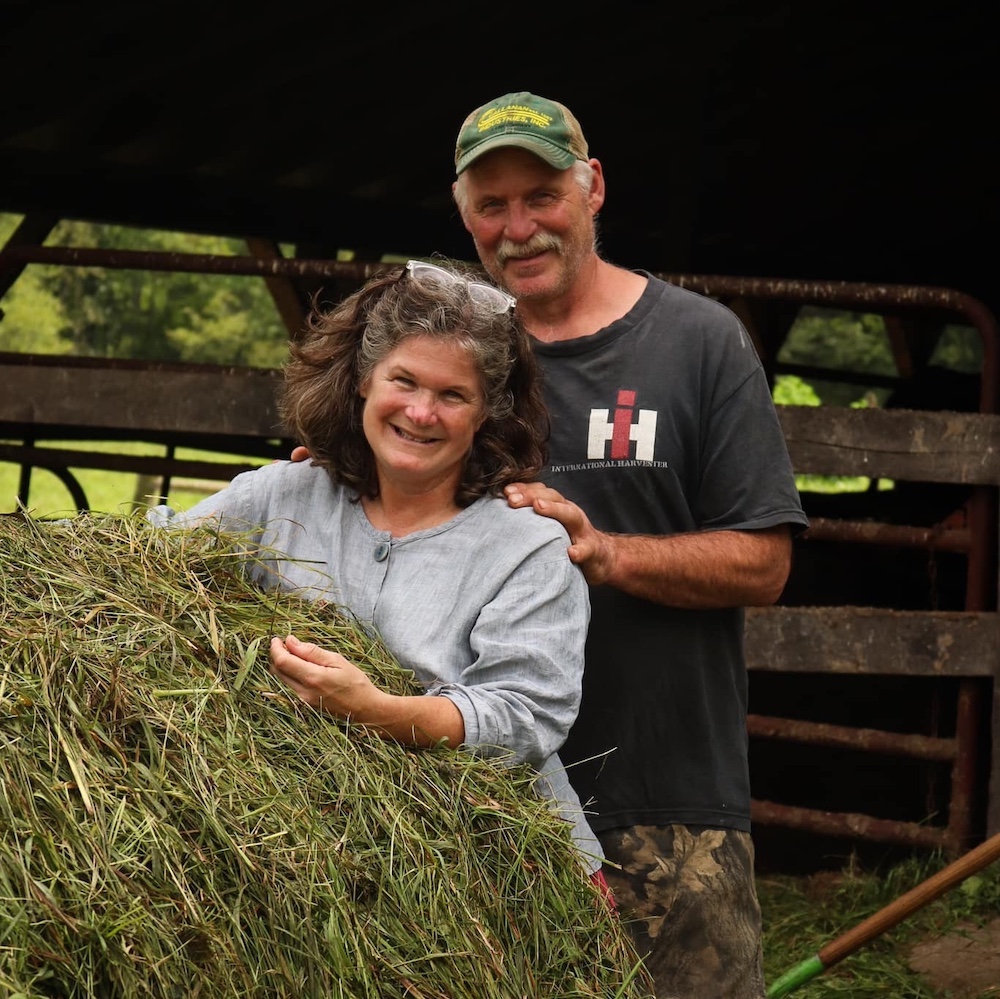
Anne Saxelby was a pioneer in the artisanal cheese industry, selling some of the best in the world at NYC’s Chelsea Market, Saxelby Cheesemongers, until her untimely death in 2021 at the age of 40. The nonprofit, established by her family to keep her passion alive, provides “monthlong paid apprenticeships for young adults to live on sustainable farms—to work, learn, and be inspired to create change in their communities.”
Even posthumously, Anne Saxelby continues to inspire and illuminate the passions and craftsmanship rife in the cheese world. The Heritage Fund matches impassioned young farmers-in-the-making with slow-food farms, keeping valuable traditional ways alive in a beautiful, hands-on manner. By doing so, apprentices can learn while providing much-needed support to often under-resourced small farms, helping them complete time-consuming and physically demanding daily tasks. Beyond the practical and physical, though, through these pairings, apprentices glean well-honed experience and vital ancestral wisdom from seasoned farmers. Meanwhile, the farmers receive this important gift: a deep-felt validation that their hard-earned life experience and knowledge are both valued and won’t be lost.
Meet Becky
Rebecca Collins Brooks is best known as a farmer, cheesemaker, writer, regular contributor to INSIDE+OUT, and proud creator and founder of The Meeting of the Milkmaids, a gathering of women working in the cheese and dairy industry. But complex lovers of life can never be contained by such commonplace descriptors, when they say things like: “We know each tree like our own faces, which ones will turn first, which will be brightest, and those that will present deep crimson leaves. We feel we are a part of this landscape as it changes seasons.”
On any given day, Becky will most likely emerge from the farmhouse or barn with her well-worn muck boots, welcoming you with her contagious exuberance and warmth. Before you’ve fully landed both feet out of the car, she may be half-laughing, half-apologizing about the mud and the cow smell– as if it’s her fault. And you will just as quickly feel that you have tumbled into a storybook with this smiling, rosy-cheeked human exuding such a thorough kindness and excitement for life– from her shiny eyes to her busy, hard-working hands and the rest of her– that you too, will love her at once.
Though she may be a self-described introvert, Becky is so friendly, open-minded, and curious about the world that she’d fool you, too. Simply put, “introvert” is not the descriptor that would come to mind in the presence of such an exuberant storyteller who seems to enjoy and cultivate connection effortlessly. Practical matters are peppered with quips, and colorful, unique stories flutter out easily, rife with laughter or heartfelt pauses and presence, helping to savor a deep feeling fully or to listen better while someone else shares. And if you’re extra lucky, you might even get to try one of her divine small-batch cheeses.
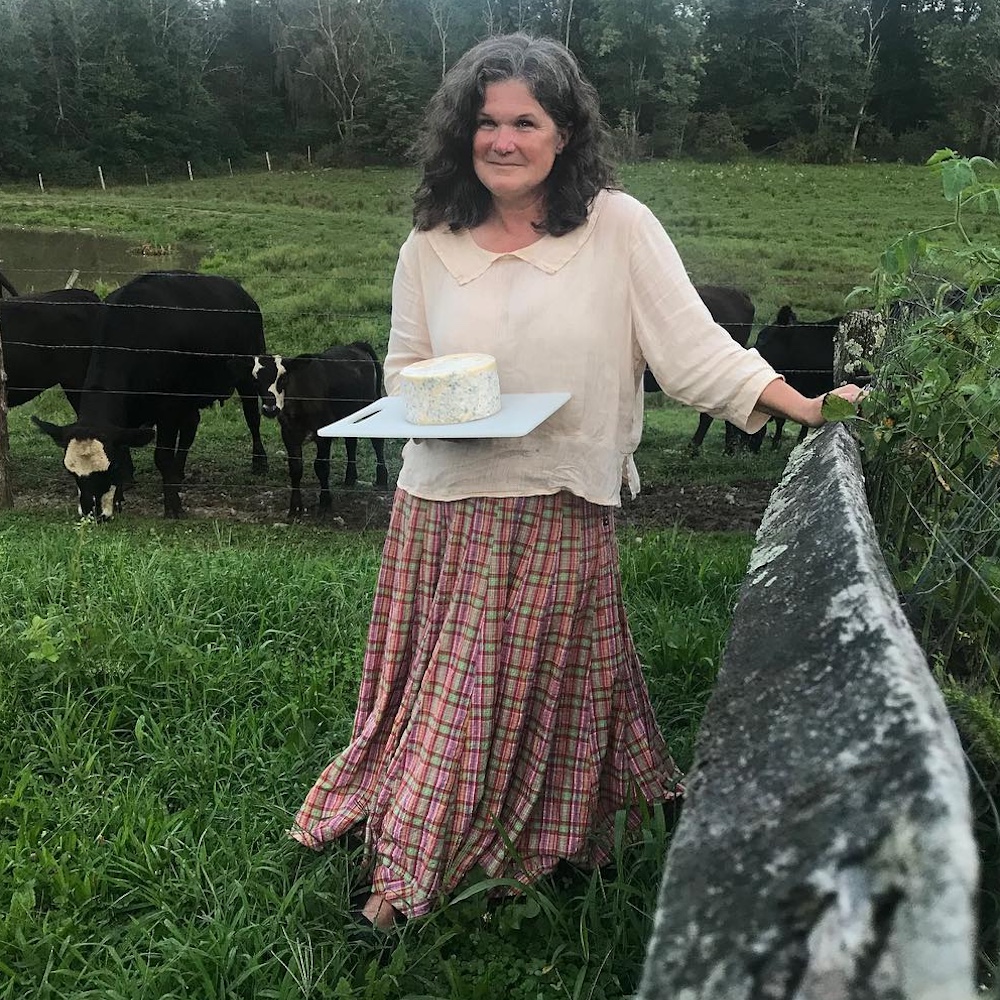
Despite the arduous physical labor and long hours she and her husband endlessly work, Becky is a woman who seems to notice and appreciate life around her with a profound depth, not seeming to take anything for granted. She writes things like: “My husband and I don’t travel or go to urban places for dinner and a show. Some might say that makes us unworldly, ignorant, or close-minded. But the truth of it is this: the world comes to our farm. We sell beautifully raised food to people from all walks of life – all colors, nationalities, political leanings (yes, all political leanings), career paths and socioeconomic brackets. We sell food to a community that looks like a cross-section of the global community. And we welcome them, talk to them, learn about them, and listen to their stories because selling the food we’ve raised is, for us, a deeply personal transaction that builds deep, personal connections.”
On any given day, Rebecca Collins Brooks is happily working harder than most mortals, knee deep in cow patties, navigating through well-loved, enormous, muscled beasts with eyes that melt your soul. You wonder how she summons the physical strength in her small body to do all that is required of her in a single day–and still finds time to write and do all the other things she does. Until you recognize all over again the indefatigable energy that passion can bring–and why any Saxelby apprentice learning alongside Becky and Bart is truly lucky. They offer not only their enthusiasm to the next generation of farmers, but also valuable insights into what heritage farming, resilience, and food sovereignty look like in real time.
“My husband and I don’t travel or go to urban places for dinner and a show. Some might say that makes us unworldly, ignorant, or close-minded. But the truth of it is this: the world comes to our farm. We sell beautifully raised food to people from all walks of life – all colors, nationalities, political leanings (yes, all political leanings), career paths and socioeconomic brackets. We sell food to a community that looks like a cross-section of the global community. And we welcome them, talk to them, learn about them, and listen to their stories because selling the food we’ve raised is, for us, a deeply personal transaction that builds deep, personal connections.”
In keeping with all that, the story of Becky and Bart and their apprentices is swoonworthy. But so is the love story that these two seem to embody– these impossibly hard-working humans who are proud of the fact that their date nights are spent “bringing in hay or chatting during milking time or bottle feeding calves.” And when they talk about it all, there is no resentment or wanting of a “better” or different life– only admiration and appreciation. A template that is so rare these days, and a true gift to anyone stopping by to purchase their incredible products, and indeed to the young apprentices who arrive through the Saxelby Fund.
Honoring A Mentor of a Kind
Becky once humbly wrote in an article in her blog series, “Gimme the Dirt… On the Importance of Cheese,” that “[Anne Saxelby’s] passing didn’t just ripple through the food world: it started a tsunami of sadness that swelled and tumbled until it reached this small farm 90 miles north of her magical shop. Her heavily dog-eared book, The New Rules of Cheese (my scribbled notes populating the margins), was sitting on my side table, and I’d saved podcasts featuring Anne Saxelby to listen to on repeat. She was certainly a presence in the food world, but she was also a presence here in our house. Hosting an apprentice for the ASLF didn’t seem like a chore or a favor – it felt like our responsibility and an honor.”
Yet at Hilltop, welcoming these young adults clearly isn’t just about extra help with chores—it’s about opening their home, their work, and their way of life to future changemakers, and sharing their genuine passion not for money, because that’s not why sustainable farmers farm, but for the relationships with the animals, Earth, and community. Together, Becky and Bart are proving that small farms can have an outsized impact on what ends up on the plate, as well as carry these lessons forward. And thankfully, those principles are not founded on the idea of mass production, but on respect for soil and water health, and the traditions that can nourish and heal people, animals, and place.
Enjoy our Exclusive Interview with Becky below to hear more about this fascinating and wonderful human, as well as delve into her blog series, “Gimme the Dirt.”
+ + +
INSIDE+OUT: Are most of the interns coming to you with previous farming experience?
Becky Collins Brooks: So this is formally called the Apprenticeship Program through the Anne Saxelby Legacy Fund. The apprentices who’ve come to live and work on our farm have had varied experience working on farms or in agriculture, ranging from some to none. All have expressed in the detailed application and interview process that they would like to learn to work with large livestock (specifically cows), resulting in their placement on this farm.
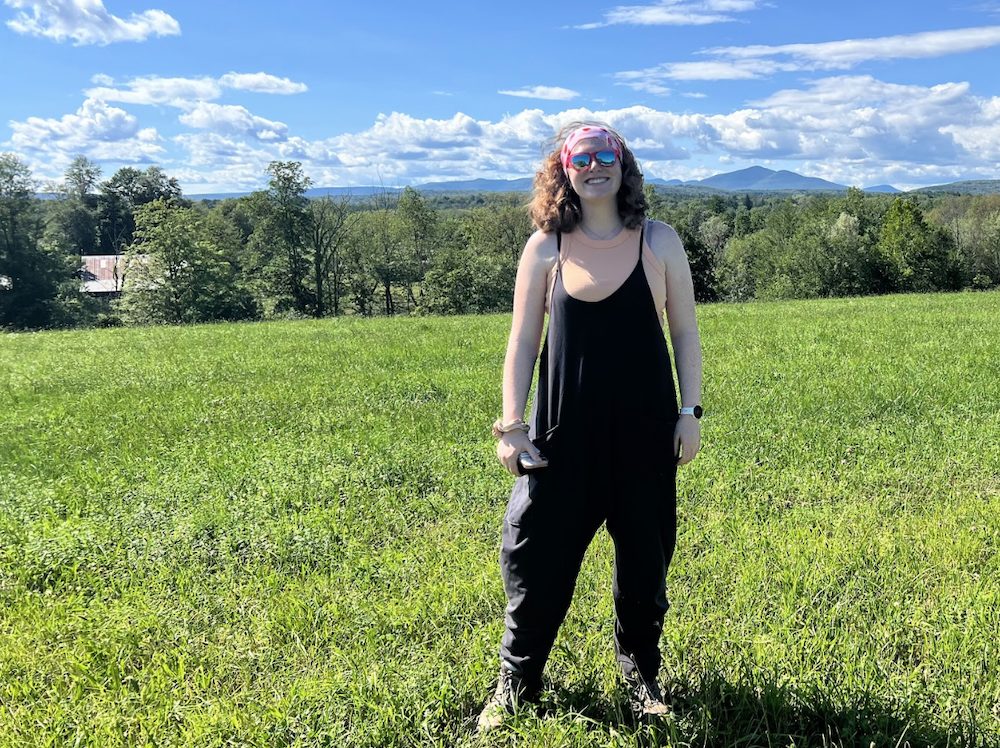
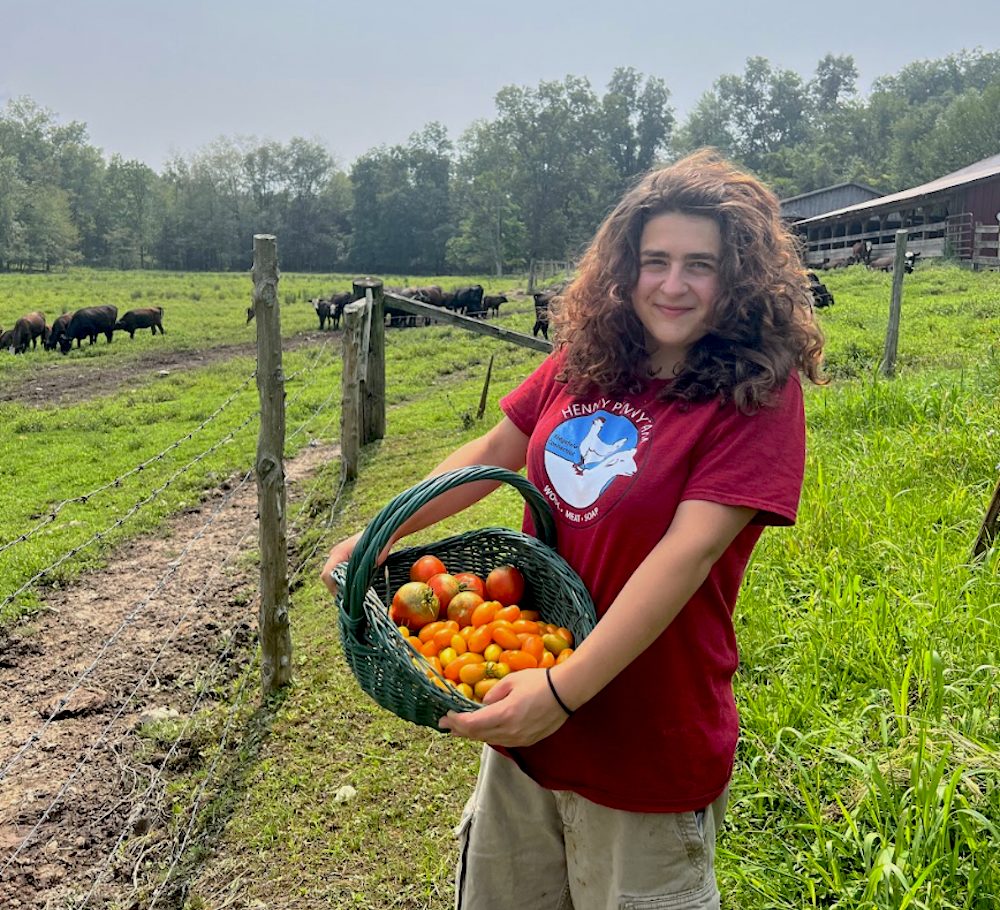
How has having extra hands through the Anne Saxelby program changed or enriched your own experience on the farm?
Becky Collins Brooks: Having young people living and working here emphasizes to us the importance of what we do every day, an idea that often gets lost in the day-to-day focus of farming. Being able to see our work and our worldview through new eyes is the most valuable thing our apprentices leave with us, but having their extra (and youthful!) hands to help us is wonderful, too. Our farm is operated by just my husband, Barton, and me. While much of our experience with our apprentices involves teaching them, once they learn—and they’ve all learned very quickly—their help is hugely helpful to us!
Are they usually of a certain age, or does that vary?
Becky Collins Brooks: The ages of our apprentices have ranged from 19 to 25.
Have most of your apprentices come from rural or urban areas, or both?
Becky Collins Brooks: They haven’t come from rural areas, but rather suburban and urban places.
When did you have your first apprentice from this program, and have they always stayed for a month? Have some stayed longer or felt that farm life was more work than they could handle?
Becky Collins Brooks: Our first apprentice was here in August of 2023. She stayed for the whole month, and on her own, she remained for a few extra days because she didn’t want to leave! She became a part of our family, but then, they all have. All of our apprentices have stayed the full month or more.
Do you ever have more than one apprentice at a time?
Becky Collins Brooks: Because our apprentices live with us, and we only have room for one, they are one at a time. And honestly, we like it that way because it means we spend important one-on-one time getting to know each of them and adapting how we work to meet their learning curve.
How many of your apprentices declared that they want to continue a life of farming despite the hardships?
Becky Collins Brooks: Our first apprentice, Kristen, went home to a job milking cows on a raw milk dairy, which she secured while here! Our second apprentice, Charlotte, graduated from college this past May and returned to agriculture with a special 2-month-long Anne Saxelby Legacy Apprenticeship at Jasper Hill Farm in Vermont (The Cellars at Jasper Hill is a renowned and award-winning artisanal cheesemaking facility). Our third apprentice, Ruby, is still in college and is working on a sheep farm this summer in a job she arranged herself. Our most recent apprentice, Viola, is from California and has worked in agriculture as a college job on the weekends for two years. She returned to CA to continue working for a walnut grower at the farmers’ market near her. So all of our apprentices have left our farm and pursued agriculture in one form or another, which is the goal. At the very least, they will always know and value the hard work it took to get their food to their plates, because they’ve done it themselves.
How long have you owned your farm?
Becky Collins Brooks: My husband Barton purchased the land from his grandfather in 1981 upon his graduation from high school when he was 18, and established Hilltop Farm then. Barton sold milk from his dairy cow, Daisybell, to the neighborhood and worked several additional jobs throughout high school. He started working at the post office during his final year of high school, a job he still holds, and that income helped. It’s important to note that times have drastically changed economically since the early 80s, and land prices here were not what they turned out to be even ten years later. There was a mortgage in the mid-double-digits, the going rate at the time, and his grandfather held the mortgage. Of COURSE this isn’t something a young person can do now – that’s obvious. But back then, it was possible with enormous hard work and someone willing to take a chance on him (his grandfather). I started farming alongside him 19 years ago when we were dating, and we established Catskill Wagyu, our beef business, in 2012. We added land to the farm about 8 years ago, so together we’ve been building a strong farm with a solid foundation and enough land to support our goals.
Was farming life love at first sight, or was it a passion that needed time to simmer?
Becky Collins Brooks: Farming is Barton’s lifelong pursuit and passion. He milked cows literally at his grandfather’s knee, and owned his first milk cow at the age of seven. He purchased his first tractor when he was 12. Farming is all he ever wanted to do, and he does it extremely well. For me, dating a farmer left little time for movies or dinners out, so bringing in hay or chatting during milking time or bottle feeding calves became our date nights. And I discovered that I really love it, too. I’ve always loved being outside – anything nature-related. Farming was a natural lifestyle transition for me to make because it checks all the boxes of my passions: soil health, food sovereignty, animal husbandry – all of what farming encompasses fits who I am intrinsically. I fell in love with my farmer and farming at the same time!
Before owning your farm, did you apprentice anywhere, did you grow up farming, or did you throw yourself into it? Please share.
Becky Collins Brooks: As I explained, Barton grew up farming with his grandfather and then for himself in his adulthood. As a young adult, he worked for several now-defunct dairy farms in town while establishing his own, learning everything he could and then applying it on the home farm. Those old farmers shared everything they knew with him, and they possessed vast quantities of knowledge. I grew up here in the Hudson Valley, too, in a rural setting with parents who were passionate about growing as much of their own food as they could. So as a kid, I tended a huge vegetable garden with my siblings and parents. We had fruit trees, berry bushes and a large grape arbor. But farms and farmers also surrounded us, and my parents raised us to have respect for the land and the people who grew our food from it. Both Barton and I were in 4-H growing up, and that provided us with a great foundation for our lives in farming. In fact, our moms were both 4-H leaders! Farming is something that is in both our family backgrounds, too, so you could say it runs in our veins.
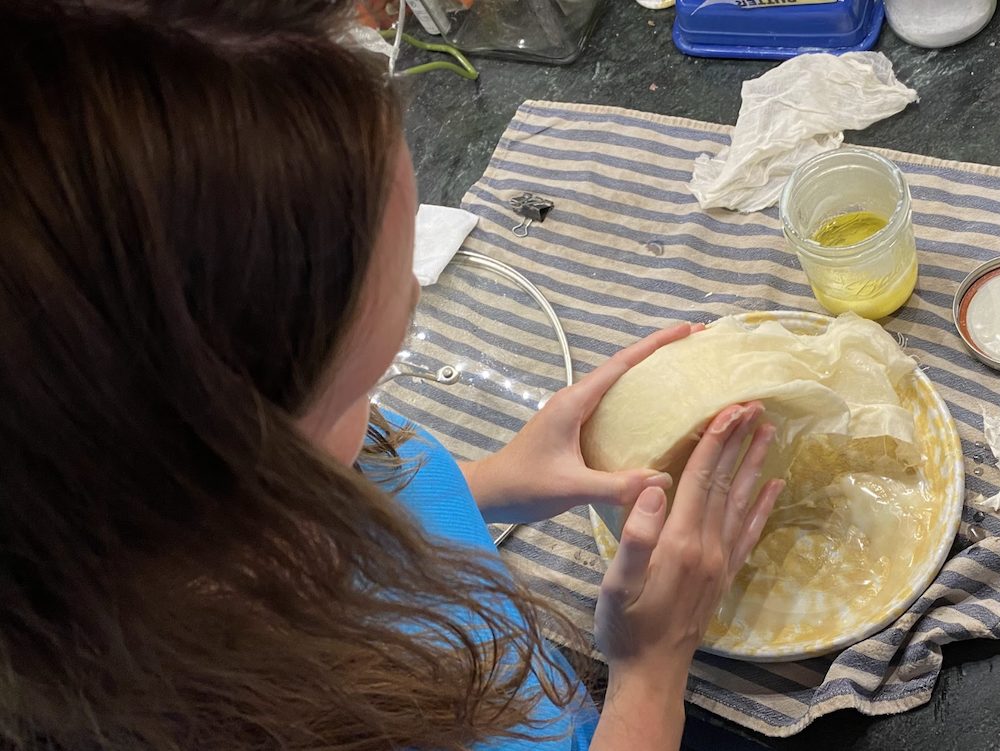
Any exciting news for this fall?
Becky Collins Brooks: The project that will consume most of our autumn months is the completion of our creamery, for which we are proud to say we received a grant from Ulster County to finish. With the infrastructure finished, we will finally be able to go through the New York state inspection process to sell raw milk to our community. Making cheese is an entirely separate licensing process requiring even more complicated rules. Once we are on our way, selling milk directly off the farm, we will pursue the next step, which is the most costly: licensing for cheese production.
Where can people purchase your products?
Becky Collins Brooks: We sell our meat directly to customers from the farm. We sell individual cuts of Wagyu, as well as non-Wagyu beef in shares, allowing customers to stock their freezers. Shares are available about once per year, and typically, we have four whole animals available for that purpose. We are also thrilled to be on the menu at Balaboosta in NYC, the restaurant of Chef Einat Admony. We feel strongly that our beef and her cuisine are a match made in foody heaven! We also have a small flock of American Bresse chickens for both meat and eggs. These are a heritage breed imported from France. They are a highly specialized breed requiring specific care and finishing for meat. Their eggs are truly spectacular, but they’re currently producing less as the season shifts to cooler weather and daylight hours decrease. We don’t use artificial light to stimulate egg production, so we will be patient until they start laying more eggs again in the spring! We also have meat birds available throughout the year, pastured here on the farm and harvested about every 8 weeks. We don’t raise “Frankenbirds” – they’re a hybrid bird that grows very quickly. We believe that adult birds taste better, and we’ve had wonderful results pasturing them.
Have you always specialized in Wagyu, or was that a more recent transition from other kinds of cows? Do you refer to them as Wagyu cows?
Becky Collins Brooks: Barton is a dairy farmer in his heart and soul. He was milking a 45-cow herd for sale to Dairylea when we were dating, but sold the herd in 2010 when the bottom fell out of the milk market for what felt like the hundredth time. It wasn’t a wise economic decision to continue producing milk for twice what he was receiving in his milk check. But it was a heartbreaking decision because he loved those cows. We raised a batch of replacement heifers to sell back into the dairy farming market when they were ready to produce milk, and we kept three of those heifers for ourselves to make our own milk and cheese. We started Catskill Wagyu about a year after the dairy herd left, because we wanted to try something no one else was doing. It has taken all this time to build a herd of purebred Wagyu from just a handful of beef animals (Herefords). They are called “Wagyu” – not “Wagyu cows” or “Wagyus.” In the Wagyu world, it is proper to simply call them “Wagyu.”
Knowing how much work farming is, would you do it all again, and what keeps you going?
Becky Collins Brooks: We absolutely cannot envision our lives any differently or doing something else. It is very hard work, both physically and mentally. The learning never stops – which is something we both love. The things that keep us going are not quantifiable: they’re experiences that very few people get. For instance, we walk to the barn most days when it’s still dark, but we get to see the morning stars and the unique sunrises every single morning. We build relationships with our animals that enrich our lives beyond measure. We spend time in the fields making hay on some of the most spectacular days of the year. Our evening walks to close in the chickens bring spectacular sunsets over the Catskills, and we can eat dinners on our porch overlooking the pasture, watching the calves running and playing or chasing the geese off the pond – it’s better entertainment than television. The work is balanced by our role in our community, providing meticulously-raised food, and by the deep friendships we’ve made just because of this farm. Knowing all that we know, we would easily do it all again. The only thing we wish would change is the burden of heavy regulations that stifle small farms and promote the growth of “the big guys,” as we believe that small farms are where the healthiest food is raised.
Please share a funny or unexpected story about one of your interns.
Becky Collins Brooks: We love words in our house. Our apprentices are from a completely different generation than ours, and some of the words they use are “interesting,” to say the least. Every single one of them has taught us to use the English language in new, creative ways! We’ve learned new words like “suss” and “rizz” and phrases like “smash or pass.” Our friends became our “squad.” One of our apprentices, who shall remain nameless, was very careful in her use of curse words, with the note that we can be very “organic” in our own language expression in moments of high stress. But she was so polite, she didn’t swear in front of us, which made us far more careful in our use of those words around her. One day, she opened a gate that had a hornet nest in it and got stung. She yelled a vicious phrase as she jumped away from the gate, and Barton came running to me to tattle like a little kid: “She said ‘@^#%$#^!’ Becky!” We laughed so hard, but only after making sure the sting wasn’t too bad! We still tease her about it to this day!
A heartfelt story?
Becky Collins Brooks: There are so many heartfelt moments with these young people, but the most heart-tugging moments are the goodbyes. Once they leave, we don’t know when or if we will see them again. And there are tears on both sides when they go. Kristen waved out her car window all the way down our farm lane – I can still see her waving in my mind’s eye. The power went out the morning Charlotte was leaving, and she delayed her departure until the power returned so she could help milk the cows one last time. This also meant we got more time together. When Ruby left, she didn’t want to drive away from here because “Goodbyes are very hard for me,” she said. So instead we went to the local ice cream shop for a cone, and she left for home from there. When we got back to our quiet and empty house, she’d left a long, beautiful letter telling us what her time here had meant to her. We hadn’t cried when she left the parking lot of the ice cream parlor, but we sure did after reading her letter. And Viola insisted on not one but three group hugs, and then she was gone. We adjust every time an apprentice leaves, but we sure do miss every single one of them.
What are the top tips you would give any apprentice or budding farmer?
Becky Collins Brooks:
1 – Don’t quit.
2 – Find your community and feed them.
3 – Seek information from legitimate sources instead of online or social media “experts.”
4 – Trust and believe in yourself.
5 – Find an older farmer whom you can continue to learn from; we guarantee it will mean as much to them as it will to you!
6 – Understand that farming is not what someone does, but rather who someone is. The tradeoffs are worth more than anything in this world, and you will be the luckiest person on the planet if you are able to farm.
7 – Find a way to financially make things work, even if it means having another job on top of farming. Think strategically regarding money: you’ll need health benefits, startup money, equipment, and land. All of it requires external resources. Find a way to make it work, and pursue it with your entire being. It’s not a lifestyle for everyone, but if you want it badly enough, it can be yours.
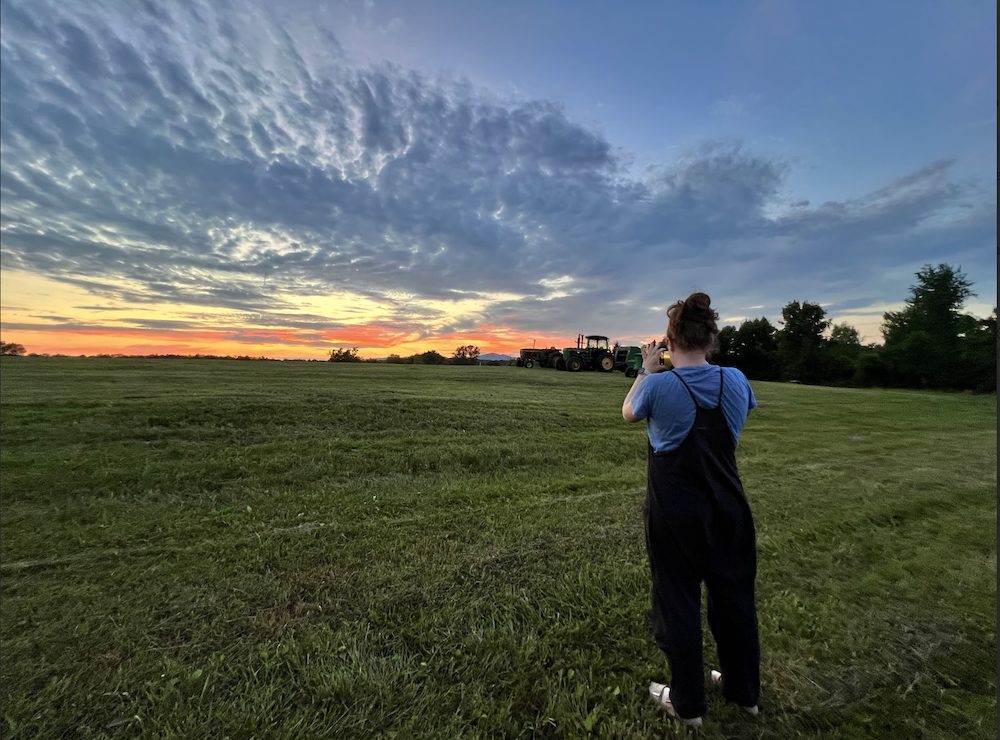
Photos courtesy of Rebecca Collins Brooks
Don’t forget to schedule an appointment at Hilltop soon to purchase Becky and Bart’s exceptional Wagyu beef, along with other farm-fresh products, and learn more about how their great products and inspiration are locally grown.
Rebecca Collins Brooks is a farmer, writer and farmstead cheesemaker at Hilltop Farm in Accord, NY. She is the creator and founder of The Meeting of the Milkmaids, a gathering of women working in the cheese and dairy industry. In addition to a small herd of dairy cows, she and her husband, Barton, raise Wagyu beef, selling meat to customers directly off the farm. Her best friends are two terriers, Winston and Molly, and Sylvie, a truly brilliant barn cat. You can visit the farm by appointment to see where truly good food is grown.
Connect with Rebecca via Instagram @catskillwagyu, on Facebook CatskillWagyu
Check out > INSIDE+OUT’s Spotlight on Catskill Wagyu at Hilltop Farm
Write a Comment
You must be logged in to post a comment.



